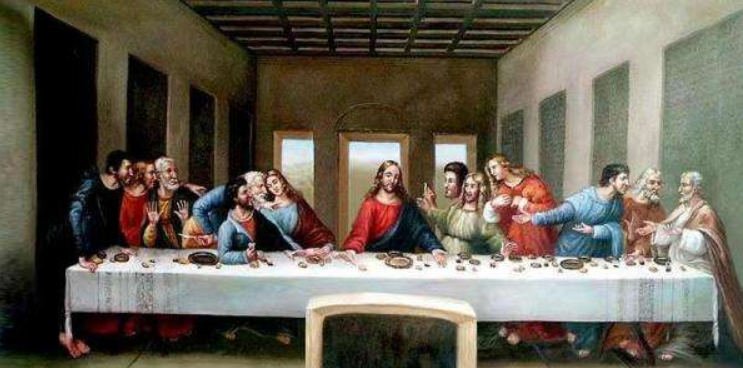
High Renaissance Art – Leonardo’s Rivals
ARTICLE 1
代写文学essay One of the main strength is that the audience can see that it was Jesus carrying the cross. It also shows the soldiers laughing
Summary of the Selected Piece of Art 代写文学essay
The Last Supper artistic drawing measures 460 cm 880 cm in size. The piece is found in Santa Maria Grazie's monastery dining hall, Milan, Italy. The concept was classical for refectories, although the house was not a dining hall when Leonardo painted it. The Last Supper, created for the dining hall of the Monastery of Saint Mary Grazie in Milan, is Leonardo's greatest work of art from the 1490s. This piece attracts a large number of fans (Kemp 2007). It depicts Jesus' last supper with his twelve apostles before his arrest and death, as well as the juncture when Jesus revealed to the apostles that, "One of you will betray me," and the confusion that this declaration caused.
Content of the Article
The article is a conglomeration of topics concerning the early times of Jesus Christ. The article's main topics are the crucifixion, resurrection, and the last supper. The writer's approach is systematic and makes the reader have an easy time following the sequence of events during Jesus Christ's time. The writer focuses on the drawing of the last supper by Leonardo De Vinci. The conclusion leaves the reader content with the article's information and a thirst to read more articles.
Significance of the article 代写文学essay
The significance of the article is particularly creating a deeper understanding of the Last supper. The theories read by generations since the times of Jesus Christ. The article help to expound on some major happenings. For instance, the pictures from De Vinci's art collection help to inject a deeper understanding to create a faint image of the real happenings. The approach used by the writer gives a chronological sequence of happenings, thus creating a deeper and stronger understanding. The easy-to-read and understand language also helps in numerous ways to scholars.

Strengths and Weaknesses of the piece
The major strength of the piece of art is the ability to portray the face of Jesus Christ so well that any audience would not ask about who Jesus is in the drawing. The drawing also shows the audience the exact number of disciples that Jesus had. Just as the Bible described the scene when Jesus revealed to the disciples that one of them would betray him, the disciples in the picture seem confused. One weakness in the picture is that the audience cannot distinguish one disciple from the other. The audience is only able to distinguish Judas and Jesus in the drawing
Strengths and Weaknesses with Evidence from the Article
For instance, Kemp (2007) pointed out that "the piece of art clearly shows Jesus and his disciples during the last supper." This shows the strength that one can easily notice and understand what the image is about. Kemp (2007) explains that "one can see the look on the disciples' faces when Jesus announced to them that it was one of them who was going to betray him," the looks of dismay and disbelief can be noticed on the disciples' faces in the piece of art. One major weakness is that after noticing Jesus and Judas in the portrait, one cannot place the other disciples, even those closest to Jesus, like John and Peter.
Article Evaluation 代写文学essay
The article is direct thus easy for the reader to understand. The author of this article is quite an eye-opener to scholars. He uses simple and artistic language to explain his ideas.
The article is clear enough for any reader to understand, be it students, scholars, and theologists. The language used by the author is also direct and simplified for anyone to understand. The main audience of the article is any scholar, and theologists. The author portrays the main ideas of each paragraph at the beginning of each paragraph. The author is quite instrumental in conveying the main content in the paragraph in the first sentences. The reader can picture what is inside the paragraph even before reading half of it.
The introduction of the article is an attention grabber to the reader. The article begins by giving a brief focus on the main content. The writer summarizes the main article contents to attract the reader to have the urge to read deeper. The writer also uses simple language that is direct to the point for the reader to understand. The pictures get the reader wanting to know more about the article, thus reading through it. Scholars love this kind of attention-grabbers. The main themes in the articles are clear and concise to follow.
There are no clear biases in the author's manner of approach. The objectiveness of the writer is recommendable. The interpretations in the articles are quite convincing to any avid reader. Any interested student, scholar, teacher, or theologist can grasp the best from the article.
ARTICLE TWO
Summary of the Selected Piece of Art
The piece of art by Freud (2013) was a piece of art drawn by Leonardo De Vinci in the early centuries to show the struggles Jesus went through after he was arrest and being subjected to a lot of torture before finally being crucified. The piece of art shows Jesus Christ carrying the cross with soldiers surrounding him and mocking him.
Article content 代写文学essay
Feud’s article on the art by De Vinci on the struggles of Jesus Christ since arrest to death focuses mainly on the struggle with the cross. In the image, Jesus is seen struggling with the cross. He seems to almost collapse under the heavyweight of the cross, but the soldiers surrounding him only laugh and curse at him.
Significance of the article
The article’s significance is to assist the audience in creating a deeper understanding of the struggles Jesus went through. For Christians, the article and the piece of art should create a feeling of guilt for sinners because, as the Bible says, Jesus went through all the struggles for the sake of the forgiveness of sinners (Feud 2013). It can also help learners understand the concept in class deeply.
Strengths and Weaknesses of the piece
One of the main strength is that the audience can see that it was Jesus carrying the cross. It also shows the soldiers laughing and mocking Jesus. It also creates a mental picture of the real happenings (Feud 2013). The articles' weaknesses are a few. One is that the soldiers are not in uniform in the picture, as they are in other drawings by other artists. The soldiers also do not have whips, and they are only a few of them, contrary to what the Bible says.
Strengths and Weaknesses with Evidence from the Article 代写文学essay
In this article, the writer says, "the soldiers forced him to carry his cross as the crowd watched"; this part is seen when the picture displays Jesus carrying his cross as the people surrounding him. There is also a weakness that one cannot distinguish the civilians from the soldiers, as the soldiers are not in uniform as it is explained in the Bible. The image also shows only a small section of the crown yet as it is explained in the Bible, the crowd was overwhelmed at the sight of Jesus’ struggles.
Article evaluation
Feud is direct in his articulation of ideas. The flow of the happenings since Jesus' arrest to death is also well explained. Any reader will find the article educative and easy to understand. Theologists and other scholars will find this article helpful (Feud 2013). Students can use this article for further reading and expansion of thoughts. Artists can also source motivation from this piece of work. The main target audience of the article is scholars and students.
The introduction of the article is motivating for the reader to dig deeper. There is a brief summary of the main content and the language used is direct and easy to understand. The use of pictures is also an attention-grabber to the reader. The main themes are easy to find and interpret. The author has no biasness and he is quick objective and recommendable
References 代写文学essay
Kemp, M. (2007). Leonardo da Vinci: the marvellous works of nature and man. Oxford University Press.
Vasari, G., Bandello, M., Giovio, P., da Vinci, L., & di Castiglione, S. (2019). Lives of Leonardo Da Vinci. Getty Publications.


 更多代写:
更多代写:

发表回复
要发表评论,您必须先登录。